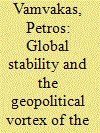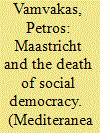| Srl | Item |
| 1 |
ID:
137612


|
|
|
|
|
| Summary/Abstract |
The geopolitical game of the twenty-first century will be multilateral and multidimensional, placing great emphasis on political and commercial interests such as resources, markets, ecology, and finance than on military interests. This essay argues that the eastern Mediterranean as an area of geostrategic importance will continue to be vital to global geopolitics and that consigning it to the back burner is shortsighted. The three continents that meet at this crossroads account for almost 90 percent of the global population as well as over 60 percent of global gross domestic product.
|
|
|
|
|
|
|
|
|
|
|
|
|
|
|
|
| 2 |
ID:
101095


|
|
|
|
|
| Publication |
2010.
|
| Summary/Abstract |
The global financial crisis of 2009-2010 has further underscored the demise of social democracy as a legitimate political alternative, for example, due to an absence of a clearly articulated alternative approach to the crisis offered by Social Democratic parties, even though neoliberal deregulated markets have proven to be vulnerable to the corrupt and opaque practices that created a massive crisis of systemic confidence. The author contends that the Maastricht process has transformed the Western European party system away from parties based on ideology and toward catchall issue-oriented parties. For Socialist and Social Democratic parties, this has meant the end of the centrality of the welfare state in their ideological domain. However, other trends have been equally damaging. Unionization, which has been in decline since the 1980s, primarily because of the changing nature of the labor force in postindustrial societies, has been further affected by the Maastricht criteria, which sought to enhance the competitiveness through increasing productivity, reducing wage costs, and significantly restructuring the labor relations that organized labor had achieved. For Social Democratic parties, the changing demographic of its support base, the ideological collapse of the Soviet Union, the adoption of the Maastricht convergence agenda, and the rise of a debt-infused consumer culture has meant death.
|
|
|
|
|
|
|
|
|
|
|
|
|
|
|
|
| 3 |
ID:
087008


|
|
|
|
|
| Publication |
2009.
|
| Summary/Abstract |
Turkey's role in the ongoing revision of the Euro-Atlantic security framework has ranged from vague to problematic. This has paralleled Turkey's protracted and equally problematic application for EU membership. Turkish dissatisfaction with this treatment has been forcefully expressed through the rejection of the Berlin Plus agreement. This paper argues that this course is counterproductive. The Euro-Atlantic security alliance needs Turkish cooperation and collaboration as much as Turkey needs it, particularly with respect to the ISAF mission in Afghanistan. Mutual policy "blind spots" can be eliminated if the stakeholders can focus on substantive policy goals rather than near-term disputes based on cultural disconnect.
|
|
|
|
|
|
|
|
|
|
|
|
|
|
|
|